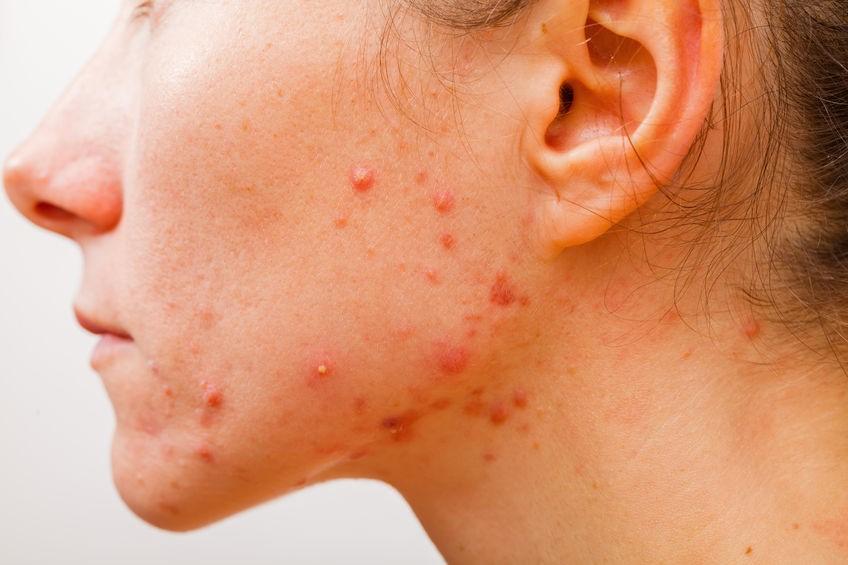Acne Causes, Symptoms, Treatments At Canadian Health&Care Mall
Acne is the most common skin condition in the West, and even though the majority of cases are among teenagers, adult acne is on the rise. More and more people in their 30s and 40s (especially women) suffer from blackheads and pimples. As any person with acne knows, this condition, while not life-threatening, can lead to severe anxiety, stress, depression, and issues of self-confidence and self-image. While exact causes of acne are still unknown, the good news is that it can be treated successfully; let our Canadian pharmacy specialists share with you the secrets!
 The causes of acne
The causes of acne
The immediate causes of acne are well known to physicians; it is the underlying reason that is still a mystery.
- Clogged pores. The tiny hairs on our skin grow out of follicles that contain a gland producing skin oil, known as sebum. The hair comes out through a tiny opening (a pore), and oil is secreted onto the surface through the pore, too. Sometimes the gland can start producing too much sebum, which clogs the follicle; the excess sebum mixes with dead skin cells, creating a great environment for the growth of bacteria.
- Bacteria. A particular species of bacteria, called Propionibacterium acnes, normally lives on the surface of our skin without causing any damage; but once it gets into a clogged pore, it starts growing into a colony. This, in turn, causes inflammation, as our white blood cells rush to fight to bacteria – that’s how we get pimples.
- Hormonal dysbalance. It is believed that the excess of male hormone androgen (which women have, too) can make oil glands produce excess sebum (here is a study on the subject https://www.ncbi.nlm.nih.gov/pmc/articles/PMC3763909/ ). Apart from normal processes of puberty, various hormonal drugs and even birth control pills can lead to acne.
- Genetics. Some studies have shown that acne can run in the family and be associated with particular chromosomes (more details here https://www.ncbi.nlm.nih.gov/pmc/articles/PMC3945714/ ).
- Oily cosmetics and wrong skin care. Excessive rubbing, using strong soaps or a wrong moisturizer cannot cause acne, but it can make existing acne worse.
Successful treatment
We often receive questions from our customers who suffer from acne but have trouble choosing a medicine. Here is what our pharmacy technician expert, Nadine, has to say on the issue:
“Acne is a complex condition that requires a complex treatment. If your acne is mild, or if you have very sensitive skin, you can go with just a cream and a gentle wash based on Himalayan herbs. But if you suffer from severe lesions, you may need a combination of oral and topical medications. The important thing is to complete the whole course of treatment, even if initially your acne may seem to get worse. It is a common effect that shows that your skin is undergoing deep changes.”
Let us take a look at the common types of acne medication, all of which are well-represented at our Canadian Health&Care Mall.
1. Retinoids to unclog the pores. Retinoids (derivatives of vitamin A) were approved for acne treatment in the 70s, and it is one of the most efficient ways to clear acne. Oral retinoid pills intensify the natural turnover of skin cells, so that new layers of skin are formed. For example, Accutane, previously used to treat severe acne, is quickly gaining popularity due to its dramatic and permanent effect.
Retinoid creams, which are applied topically, peel off dead skin cells and unclog sebum-filled pores, allowing other medication to access the follicle and oil glands. In this group, the well-known Retin-A and Differin creams are particularly recommended.
Please note that when you start using retinoids, your skin may initially redden and start peeling, making your acne appear worse. This is the normal way that retinoid medication works: eventually the reddening will subside, and in a few weeks you will see significant results. Meanwhile, use only gentle facial wash in order not to irritate the skin, such as the Neem Face Wash.
2. Antibiotics. Remember that the reason for inflamed pimples and red lesions is the growth of bacterial colonies. Antibiotics are designed to kill bacteria, including those on the skin, so it’s no surprise that they are used to treat acne. Lincomycin is an antibiotic that works very well against Propionibacterium acnes, and this active ingredient is found in the Clindamycin gel.
Remember that, while the use of antibiotics will help against inflammation, long-term antibiotic use can make the bacteria resistant; thus, you need to use antibiotic medications in a combination with something to unclog the pores to prevent the appearance of new bacteria.
3. Benzoyl peroxide. While retinoids work great for many people, those with more sensitive skin may wish to use something gentler. Medications containing benzoyl peroxide, such as Benzac, will unclog your pores without causing excess irritation of the skin.
4. Herbal remedies. In South Asia, acne has been successfully treated for millennia thanks to the unique diversity of local flora, especially in the Himalayas. Such Indian and Nepalese plants as Rubia cordifolia, Curcuma, and the Neem tree, have strong antibacterial and anti-inflammatory properties, perfectly suitable for those people whose skin is prone to allergy. The Canadian Health&Care Mall offers a wide range of highly efficient herbal treatments. Combining Purim capsules with a Neem facial wash and a cream such as Clarina, which contains Rubia and Aloe barbadensis, will allow you to achieve a deep cleansing and healing effect.
Care for your skin properly
If you suffer from acne and are taking medication, most standard soaps and scrubs may irritate your skin even more. In addition to acne treatments proper, we suggest choosing a gentle anti-acne soap that will prepare your skin for further treatment, such as the Acne-Aid. And if you feel that your oily skin still needs peeling, forget rough traditional scrubs with apricot kernels or coffee; rather, take a look at our luscious peeling mask with almond and cucumber.
Read more useful articles:


